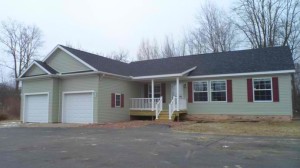Why Precast Concrete Basement Walls Have Cracks?
 In order to better understand some of the reasons why precast concrete basement walls will develop cracks, we first need to look at the concrete itself.
In order to better understand some of the reasons why precast concrete basement walls will develop cracks, we first need to look at the concrete itself.
Composition of the Precast Concrete
Precast concrete is composed of 4 major elements, which are the aggregate, cement powder, chemical catalyst and water. Aggregate is usually a fine sand and a stone or gravel base. Cement powder base is a mixture of calcium, silicone, aluminum and iron. Then a chemical catalyst is the element added to promote curing. The final element is water.
Factors Affecting the Precast Concrete Basement
For example a 24 by 24 modular home basement with 8 foot tall walls at 10 inches will require about 24 cubic yards of precast concrete as well as over 4000 gallons of water. As those water cures out there is the possibility of shrinkage and cracking. Increasing the volume of water to 8 gallons per unit will result to about 40 % loss of compressive strength to the basement walls.
Other factors such climate conditions and the existence of re-enforcing metal bars can also play a part in the formation of modular home basement wall cracks. If the weather to wet or cold the concrete may cure to slowly to hot and dry and the concrete may cure too rapidly. Re-enforcing bars, know as rebar, are designed to limit movement and cracking. Unlike in the past, modular homes have re-enforcing rebar incorporated into the precast concrete foundation.
However precast concrete foundation wall cracks are not the only points that water may leak into the basement through the wall. Two of the other additional issues are old tie form holes and honey combing. When the foundation walls are poured there are metal rods used to hold the inner and outer wall forms together. After the forms are pulled the tie rods are snapped off next to the foundation. Over time excessive moisture will cause the metal to rust away leaving an open gap for water seep through. Honey combing refers to a portion of the foundation were the concrete was not properly shifted as it is poured. The end result is a gravel pocket where the finer cement mix did not get incorporated into the aggregate leaving open gaps for water egress to occur.
Despite the fact that basement wall cracks are inevitable you are assured not all of them will leak. However you can be one of the unlucky homeowners whose crack does develop seepage. Don’t worry as there are in-expensive, proven methods of repair available.
In case you still have question about modular homes and insulated precast foundation, you may contact Legendary Homes Inc in Jackson, Michigan. A representative will be happy to assist you. Meanwhile you can check our modular home price sheets by signing up to our blog


